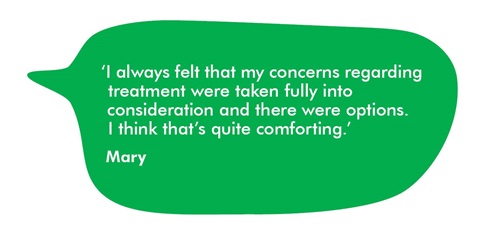This week is Sarcoma Awareness Week. In this blog, we explain more about sarcomas, how they are diagnosed, and coping with being told you have a sarcoma.
What are sarcomas?
Sarcomas are rare cancers. They can develop in the:
About 3,300 people a year are diagnosed with a soft tissue sarcoma and around 580 people with a bone sarcoma. If you are diagnosed with Ewings Sarcoma you might not even know if it has started in the bone or muscle. We have information about many types of soft tissue sarcomas and bone cancers.
Diagnosing sarcomas
If you think you have symptoms of a soft tissue sarcoma or symptoms of a bone sarcoma you will usually start by seeing your GP. If your GP is unsure what the problem is, or thinks your symptoms could be caused by cancer, they will refer you to a hospital specialist. If your GP suspects that you might have a sarcoma, you will usually be seen at the hospital within two weeks.
The specialist will ask about your general health and any previous medical problems. They will also examine you. This will include feeling the area where there is pain or swelling.
You may some have tests at the hospital to diagnose a sarcoma, such as:
If you are diagnosed with a sarcoma you may need further tests. This is to see exactly what type of sarcoma you have and whether it has spread. This will help the doctors decide what treatment is best for you.
It can be a difficult time waiting for results. It may take from a few days to a couple of weeks for the results of your tests to be ready. You may find it helpful to talk with your partner, your family or a close friend. Your specialist nurse or organisations like Sarcoma UK may also be able to offer support. You may want to talk things over with one of our cancer support specialists on 0808 808 00 00, Monday to Friday, 9am to 8pm or join the soft tissue sarcoma group on our Online Community.
The video below shows Anthony talking about how he coped with his wife Waheed's sarcoma diagnosis.
Coping
It’s common to feel overwhelmed by different feelings when you’re told that you have cancer. Everyone reacts differently. There is no right or wrong way to feel and you will cope with things in your own way. Talking to people close to you or other people affected by cancer might help. Partners, family and friends may also have some of the same feelings.

After treatment, you may just want to get back to everyday life. But you may still be coping with the side effects of treatment, adjusting to physical changes or dealing with some difficult emotions. Recovery takes time, so don’t rush it and try to be kind to yourself.
To see what else Macmillan's cancer information team has been blogging about, please visit our blog home page! You can subscribe to receive our blogs by email or RSS too.
We're with you every step of the way
The Macmillan team is here to help. Our cancer support specialists can answer your questions, offer support, or simply listen if you need a chat. Call us free on 0808 808 00 00.
Comments? Feel free to add them below (you need to be logged in).
Keep in touch Follow Macmillan’s cancer information team on Twitter @mac_cancerinfo
Whatever cancer throws your way, we’re right there with you.
We’re here to provide physical, financial and emotional support.
© Macmillan Cancer Support 2026 © Macmillan Cancer Support, registered charity in England and Wales (261017), Scotland (SC039907) and the Isle of Man (604). Also operating in Northern Ireland. A company limited by guarantee, registered in England and Wales company number 2400969. Isle of Man company number 4694F. Registered office: 3rd Floor, Bronze Building, The Forge, 105 Sumner Street, London, SE1 9HZ. VAT no: 668265007